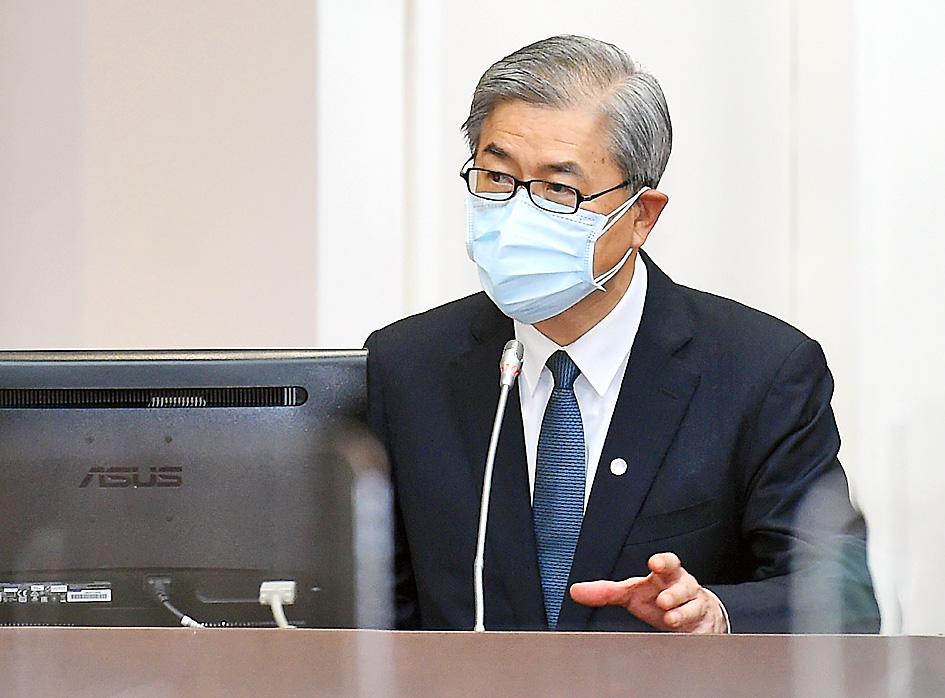The local insurance industry is expected to face more than NT$41 billion (US$1.38 billion) in COVID-19 claims amid a surge in domestically transmitted cases, Financial Supervisory Commission (FSC) Chairman Thomas Huang (黃天牧) said yesterday.
In a meeting of the legislature’s Finance Committee, Huang cited an internal assessment that forecast insurance claims would surpass a NT$41 billion estimate made by a legislator.
Chinese Nationalist Party (KMT) Legislator Lai Shyh-bao (賴士葆) said that non-life insurance companies had sold about 7.6 million COVID-19 policies that are to pay holders if they test positive for the disease or are placed in quarantine as close contacts of positive cases.

Photo: Chu Pei-hsiung, Taipei Times
Based on a 15 percent infection confirmation rate and an average policy value of NT$36,000, the insurance industry could face about NT$41 billion in claims, Lai said.
Huang said that with the number of local COVID-19 cases still rising, the amount of total claims could surpass that estimate, but added that he could not yet give an exact figure.
Worries about an increase in COVID-19 insurance claims have risen amid a surge in local cases, particularly in the local equity market as stocks of financial companies with large insurance assets have come under pressure due to expectations of heavy financial burdens, dealers said.
Democratic Progressive Party Legislator Chiang Yung-chang (江永昌) said that based on his estimates, if the COVID-19 confirmation rate rises to 20 percent among an anticipated 8 million insurance policies, total claims could reach NT$100 billion, putting more financial pressure on the local insurance industry.
Chiang said that the government should help non-life insurance firms manage the problem by providing financial relief with funds from the national insurance guaranty fund, but Huang dismissed the proposal.
He said that the commission would encourage insurance firms to raise their capital size by having shareholders contribute more toward financial restructuring.
The commission was not inclined to use public funds to solve the industry’s financial problems, he said, adding that he had faith the local non-life insurance industry would remain resilient as long as its shareholders participate in capital increases.
The insurance guaranty fund for non-life insurance firms is about NT$5 billion, the commission said.
Some non-life insurance firms, which have been caught off guard by an explosive increase in domestic COVID-19 cases, have cited the “double insurance” clause under the Insurance Act (保險法) as grounds for not paying those who bought more than one COVID-19 policy.
Under the act, double insurance refers to when a person “enters into multiple insurance contracts with multiple insurers covering the same insurable interest and the same insured event.”
Non-life insurance companies have said that engaging in double insurance leads to “moral hazard,” which is when a person or entity increases their exposure to risk, as they would not bear the full costs of the risk.
However, if the insurers approved the policies, they must pay the claims and are not allowed to revoke the policies using the double insurance clause, Huang said.

Taiwan will prioritize the development of silicon photonics by taking advantage of its strength in the semiconductor industry to build another shield to protect the local economy, National Development Council (NDC) Minister Paul Liu (劉鏡清) said yesterday. Speaking at a meeting of the legislature’s Economics Committee, Liu said Taiwan already has the artificial intelligence (AI) industry as a shield, after the semiconductor industry, to safeguard the country, and is looking at new unique fields to build more economic shields. While Taiwan will further strengthen its existing shields, over the longer term, the country is determined to focus on such potential segments as

UNCERTAINTY: Innolux activated a stringent supply chain management mechanism, as it did during the COVID-19 pandemic, to ensure optimal inventory levels for customers Flat-panel display makers AUO Corp (友達) and Innolux Corp (群創) yesterday said that about 12 to 20 percent of their display business is at risk of potential US tariffs and that they would relocate production or shipment destinations to mitigate the levies’ effects. US tariffs would have a direct impact of US$200 million on AUO’s revenue, company chairman Paul Peng (彭雙浪) told reporters on the sidelines of the Touch Taiwan trade show in Taipei yesterday. That would make up about 12 percent of the company’s overall revenue. To cope with the tariff uncertainty, AUO plans to allocate its production to manufacturing facilities in

COLLABORATION: Given Taiwan’s key position in global supply chains, the US firm is discussing strategies with local partners and clients to deal with global uncertainties Advanced Micro Devices Inc (AMD) yesterday said it is meeting with local ecosystem partners, including Taiwan Semiconductor Manufacturing Co (TSMC, 台積電), to discuss strategies, including long-term manufacturing, to navigate uncertainties such as US tariffs, as Taiwan occupies an important position in global supply chains. AMD chief executive officer Lisa Su (蘇姿丰) told reporters that Taiwan is an important part of the chip designer’s ecosystem and she is discussing with partners and customers in Taiwan to forge strong collaborations on different areas during this critical period. AMD has just become the first artificial-intelligence (AI) server chip customer of TSMC to utilize its advanced

Chizuko Kimura has become the first female sushi chef in the world to win a Michelin star, fulfilling a promise she made to her dying husband to continue his legacy. The 54-year-old Japanese chef regained the Michelin star her late husband, Shunei Kimura, won three years ago for their Sushi Shunei restaurant in Paris. For Shunei Kimura, the star was a dream come true. However, the joy was short-lived. He died from cancer just three months later in June 2022. He was 65. The following year, the restaurant in the heart of Montmartre lost its star rating. Chizuko Kimura insisted that the new star is still down